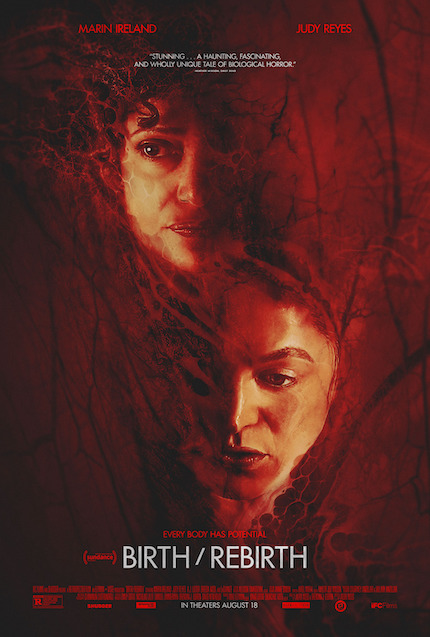BIRTH/REBIRTH Review: Bold and Brilliant Frankenstein Story for the 21st Century
Laura Moss directed the horror drama, starring Marin Ireland, Judy Reyes, and A.J. Lister. IFC Films releases, only in movie theaters, on Friday.

[Note: Some minor spoilers follow.]
Long in the public domain, Mary Shelley’s seminal 1818 novel, Frankenstein (full title: Frankenstein; or, The Modern Prometheus), has formed, shaped, and influenced popular culture and our complex, contradictory relationship with science and scientific advance and/or progress. To wit, science — along with the technological innovations it implies — has led to paradigm-shifting changes, most beneficial, some not, often simultaneously.
But advance science does, extending the human lifespan beyond anything Shelley or her contemporaries could have imagined, providing material comforts across and between social classes unimaginable even a century ago, and profoundly connecting people, countries, and cultures in both positive and negative ways.
Shelley’s ur-text has been variously read as a cautionary tale about playing God, usurping the role of nature and biology, pre-industrial age hubris, and, in closer reading, as a proto-feminist tract embodying the fears and anxieties of procreation and parenthood. Exemplified by James Whale’s 1931 masterpiece, Frankenstein, the most common reading, however, centers on the “playing God” idea, of men -- it’s always been men -- sidestepping moral, ethical, and even legal prohibitions to resurrect and reanimate the dead and thus, becoming not just like gods, but gods themselves while also diminishing, if not outright eliminating, the role of women in procreation.
Two centuries after Shelley’s novel and almost a century since Whale and his collaborators rewrote the conventions and tropes of the horror genre, the idea seems to have grown stale, overdone by commercial studios and indie filmmakers alike. Fortunately for us, however, revisiting a cliche-heavy sub-genre didn’t stop writer and director Laura Moss from making a bold, brilliant debut with Birth/rebirth, an original, twisty retelling of the Frankenstein story for 21st-century audiences.
Birth/rebirth opens not with the “birth” or “rebirth” of the title, at least not literally, but with an intentionally disorientating sequence involving a dying pregnant woman, an ambulance, and a graphic, visceral C-section that would make David Cronenberg, the Master of Body Horror, flinch and, at least for some members of the audience on the other side of the screen, either embrace Moss’ matter-of-fact, clinical approach to birth, death, and everything in between or simply give up and exit the theater (or hit end on their VOD order or streaming service).
As a nurse, Celie (Judy Reyes) guides the still-alert woman through her last moments; the doctors succeed in saving the baby, but not the mother. The woman’s bloody, exposed body, no longer alive, no longer conscious, becomes nothing more (or less) than an object, an object to be examined, probed, analyzed, and finally released to the coroner’s office by the hospital’s in-house pathologist, Dr. Rose Casper (Marin Ireland), after she completes the necessary paperwork.
Before long, however, Celie, a maternity nurse whose personal and professional lives depend on empathy, kindness, and compassion, and Rose, an obsessive, neurotic scientist likely on the spectrum, cross paths when Celie’s preteen daughter, Lila (A.J. Lister), dies unexpectedly from bacterial meningitis. The disappearance of Lila’s body from the hospital, however, halts Celie’s journey through the five stages of grief (denial, anger, bargaining, depression, and acceptance), Instead, she remains at the “anger” stage until, less by chance and more by perseverance, she discovers a newly resurrected Lila in Rose’s apartment.
Obviously illegal, more than likely immoral and unethical (no parental consent), Rose’s actions are difficult to justify by any rationale beyond an obligatory, facile “for science,” but it’s Celie — and what she represents, i.e., pure maternal instinct — that serves first as a counter-balance and later a complement to Rose’s otherwise unforgivable actions. It’s key to Moss’s project of creating sympathy for Celie’s predicament and, by extension, Celie’s inexorable, inevitable complicity in Rose’s experiments to save her daughter.
Saving Celie’s daughter isn’t a one-and-done experiment, requiring frequent infusions of a stem cell-based serum created by Rose through a series of ethically thorny, borderline immoral actions that are even more provocative and potentially off-putting than Rose’s initial decision to reanimate Lila without Celie’s consent or regular medical protocols. When, however, that serum begins to run out, Rose and Celie are forced to confront how far they’ll go, Rose to see her experiment succeed and a lifetime of research and study vindicated, and Celie to bring her daughter back fully to the life she once lived and the decades of life presumably ahead of her.
Birth/rebirth never takes sides (Rose, Celie’s, or a third, unspecified one), instead allowing audience members to make the determination for themselves whether Rose or Celie should be perceived as heroic, villainous, or something else altogether. That “something else” certainly qualifies as murky, the liminal space where moral and ethics have no clear, clear-cut, definitive answers, only questions resolved, however imperfectly or unsatisfactorily, on a profoundly personal, case-by-case basis.
Review originally published during the 2023 Sundance Film Festival in January 2023. The film opens Friday, August 18, 2023, in U.S. theaters, via IFC Films.







